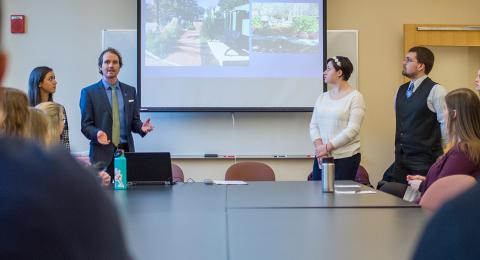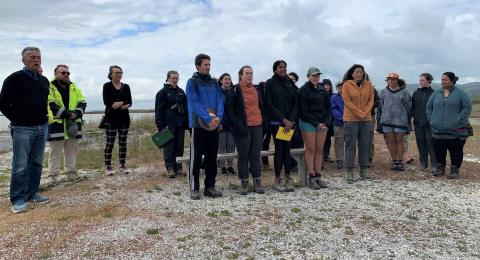The Community and Environmental Planning major at UNH is an interdisciplinary program that combines urban planning, environmental science, and public policy, providing students with the skills to address complex issues like land use, environmental conservation, and community development. Students gain hands-on experience through internships, fieldwork and collaboration with local organizations. This major appeals to students passionate about social justice, sustainability,and making a positive impact on the environment and society. Graduates are well-prepared for careers in urban planning, environmental consulting, nonprofit work and government roles focused on sustainable development and community engagement.
What is community and environmental planning?
Community and environmental planning is about making our communities better places to live, work and play. Students pursuing this major explore subjects such as economic development, transportation, affordable housing, green space, sustainability and local agriculture. They gain the knowledge and skills needed to manage development, assess the consequences of proposed changes, protect natural resources and recommend program, policy and regulatory changes.
Why study community and environmental planning at UNH?
Students in the community and environmental planning program do more than sit in a classroom. Through an interactive and dynamic curriculum that includes outreach work, students develop a solid foundation in the basic principles of community planning and critical related topics such as natural resources, economics and political science and apply their knowledge in the real world through the program’s internship requirement. Students also have the opportunity to participate in the Semester in the City program in Boston, a rigorous 30+ hour per week internship with a leading social change organization designed to equip a new generation of leaders dedicated to the public good.
Potential careers
- Community planner
- Conservation planner
- Economic development planner
- Environmental planner
- Land use planner
- Parks and recreation planner
- Regional planner
- Transportation planner
- Sustainability planner
- Urban planner
Curriculum & Requirements
The Community and Environmental Planning (CEP) program is designed to provide students with the knowledge and skills to become effective community planners in the public or private sector. All of the courses are designed to give the student a diverse skill-set in planning for the sustainability of communities. CEP students are provided a solid planning background with planning courses covering local, state and regional planning topics and methods. CEP students also take foundational courses in natural resources, geographic information systems, economics, and statistics, as well as a political science course, and a social issues course. The internship requirement allows the planning student to apply their knowledge in the real world for instrumental hands-on experience. Semester in the City is also an option for the internship experience. CEP students are encouraged to focus their remaining hours on skills that can enhance their CEP major such as a dual major, a minor, or study abroad.
Expected CEP Student Outcomes:
- The foundational education in planning, natural resources, economics and sustainability.
- The fundamental values of diversity, equity, justice, and protection of community and the environment.
- The ability to assess, discuss, and engage others in the problems and potential solutions associated with impacts of land use changes.
- The ability to work with community members and professionals in the design and implementation of community improvements in building and transportation while protecting natural and built resources.
Students may go on to work in the community development or community planning departments in local communities. They may also choose to work in regional planning agencies, or with a state or federal office. Other options include the private sector, such as architectural or development companies, or the non-profit sector, such as with community development corporations or conservation groups. The American Planning Association provides a certification process for the planning profession (American Institute of Certified Planners) after several years of planning experience. Students may also choose to go on to graduate studies in Community and Environmental Planning, Natural Resources Management, Public Administration, or a related field.
Sample Degree Plan
This sample degree plan serves as a general guide; students collaborate with their academic advisor to develop a personalized degree plan to meet their academic goals and program requirements.
| First Year | ||
|---|---|---|
| Fall | Credits | |
| CEP 415 | Community Development Perspectives (Also counts as Discovery Social Science) | 4 |
| NR 435 or NR 507 | Contemporary Conservation Issues and Environmental Awareness or Introduction to our Energy System and Sustainable Energy | 4 |
| NR 411 | Environmental and Resource Economics Perspectives | 4 |
| ENGL 401 | First-Year Writing (Counts as Discovery Writing) | 4 |
| Credits | 16 | |
| Spring | ||
| Choose any Discovery courses. Here are some suggestions: | ||
| Discovery Biological Science with Lab (Consider BIOL 430 or NR 433) | 4 | |
| Discovery Historical Perspectives (Consider ARTS 574) | 4 | |
| Discovery Humanities (Consider PHIL 430) | 4 | |
| Inquiry Course (Choose any) | 4 | |
| Credits | 16 | |
| Second Year | ||
| Fall | ||
| NR 525 or BIOL 528 | Statistical Methods and Applications (Also counts as Discovery Quantitative) or Applied Biostatistics I | 4 |
| POLT 502 or POLT 500 or POLT 523 or POLT 595 | State and Local Government or American Public Policy or American Political Thought or Smart Politics | 4 |
| Choose any Discovery course. Here are some suggestions: | 4 | |
| Discovery Physical Science (Consider ESCI 409, ESCI 405, or NR 504) | ||
| Discovery Fine and Performing Arts (Choose any) | 4 | |
| Credits | 16 | |
| Spring | ||
| CEP 508 | Applied Community Development | 4 |
| SOC 450 or SOC 565 or INCO 505B | Contemporary Social Problems or Environment and Society or Social Innovator's Toolbox | 4 |
| NR 602 | Natural Resources and Environmental Policy | 4 |
| Discovery World Cultures (Choose any) | 4 | |
| Credits | 16 | |
| Third Year | ||
| Fall | ||
| CEP 614 | Fundamentals of Planning | 4 |
| CEP 627 | Community Economics | 4 |
| CEP 672 or CEP 673 | Fundamentals of Real Estate or Green Real Estate | 4 |
| NR 767W | Social Impact Assessment (or NR 724 in the spring) | 4 |
| May consider CEP 794, INCO 505I, study away, or courses toward a minor. | ||
| Credits | 16 | |
| Spring | ||
| NR 658 | Introduction to Geographic Information Systems | 4 |
| NR 724 | Resolving Environmental Conflicts (or NR 767W in the fall) | 4 |
| Elective | 4 | |
| Elective | 4 | |
| May consider CEP 794, INCO 505I, study away, or courses toward a minor. | ||
| Credits | 16 | |
| Fourth Year | ||
| Fall | ||
| Elective | 4 | |
| Elective | 4 | |
| Elective | 4 | |
| Elective | 4 | |
| May consider CEP 794, INCO 505I, study away, or courses toward a minor. | ||
| Credits | 16 | |
| Spring | ||
| CEP 777 | Topics in Community Planning | 4 |
| NR 785 or NR 784 | Systems Thinking for Sustainable Solutions or Sustainable Living - Global Perspectives | 4 |
| CEP 794 | Community and Environmental Planning Internship | 4-8 |
| Elective | 4 | |
| Credits | 16-20 | |
| Total Credits | 128-132 | |
Degree Requirements
All Major, Option and Elective Requirements as indicated.
*Major GPA requirements as indicated.
Major Requirements
Courses with the subject prefix CEP must be completed with a C- or above (6 courses total). In addition to the CEP degree requirements (below), students must complete the University Discovery Program and the University Writing Requirements.
| Code | Title | Credits |
|---|---|---|
| Planning Courses: | ||
| CEP 415 | Community Development Perspectives (Discovery Course) | 4 |
| CEP 508 | Applied Community Development | 4 |
| CEP 614 | Fundamentals of Planning | 4 |
| CEP 672 | Fundamentals of Real Estate | 4 |
| or CEP 673 | Green Real Estate | |
| CEP 794 | Community and Environmental Planning Internship 1 | 4-8 |
| or INCO 505I | Internship: Semester in the City (Boston) or Semester for Impact (NH) | |
| CEP 777 | Topics in Community Planning (Capstone for the major) | 4 |
| Natural Resources Courses: | ||
| NR 435 | Contemporary Conservation Issues and Environmental Awareness | 4 |
| or NR 507 | Introduction to our Energy System and Sustainable Energy | |
| NR 602 | Natural Resources and Environmental Policy | 4 |
| NR 658 | Introduction to Geographic Information Systems | 4 |
| NR 785 | Systems Thinking for Sustainable Solutions | 4 |
| or NR 784 | Sustainable Living - Global Perspectives | |
| NR 724 | Resolving Environmental Conflicts | 4 |
| or NR 767W | Social Impact Assessment | |
| Economics and Statistics Courses: | ||
| NR 411 | Environmental and Resource Economics Perspectives | 4 |
| NR 525 | Statistical Methods and Applications | 4 |
| or BIOL 528 | Applied Biostatistics I | |
| CEP 627 | Community Economics | 4 |
| Political Science Course: | ||
| POLT 502 | State and Local Government | 4 |
| or POLT 500 | American Public Policy | |
| or POLT 523 | American Political Thought | |
| or POLT 595 | Smart Politics | |
| Social Issues Course: | ||
| SOC 450 | Contemporary Social Problems | 4 |
| or INCO 505B | Social Innovator's Toolbox | |
| or SOC 565 | Environment and Society | |
| Total Credits | 64-68 | |
- 1
INCO 505I Internship: Semester in the City (Boston) or Semester for Impact (NH) and INCO 505A Becoming a Problem Solver are taken as a 12-credit internship along with INCO 505B Social Innovator's Toolbox, which fulfills the Social Issues course requirement.
CEP students are encouraged to have a study away/abroad experience, a dual degree, a minor, or focused area of study which add value to the CEP degree. Consider the following to complete the minimum of 128 credits:
- Semester in the City (if you have not done this in the CEP major)
- EcoQuest New Zealand (16 credits in electives - must qualify with EcoQuest)
- Study Away
- Study Abroad
- Minor as approved by the minor program
- Courses to round out a focus area. It is recommended that you choose upper level courses in NR and EREC.
Program Learning Outcomes
- Functional fluency in the use of traditional and contemporary planning tools, methods, projects, programs, and regulatory tools.
- Analysis and articulation of social and environmental problems through the use of reliable and valid sources.
- Inventory, assessment, and documentation techniques of existing resources in the built and natural environment.
- Assessment methods of the consequences of proposed changes to the landscape at different scales, from local to regional.
- Communication strategies for a diverse population regarding social and environmental issues related to community planning and development.
- Engagement strategies for various stakeholders in the planning process through a variety of public engagement techniques.
- Development of the comprehensive master planning process and documentation with lay and professional planners.
- Skilled writing and public speaking in order to engage all stakeholders in the planning process.
- Creative thinking and scenario design development and use regarding possible futures.
- Networking with a variety of stakeholders for building a strong social network within and between communities and organizations.
- Ability to work with the various scales of planning – federal, state, regional, local, neighborhood, and site levels.
- Awareness of the opportunities for planning work in government, non-government, non-profit, Cooperative Extension, and the private sector in planning, environmental conservation, architecture, construction, and others.
- Advocacy focus for all residents, businesses, organizations and visitors regardless of income, gender, race, ethnicity, religion or other stratifications within society.
- Applied application of planning education and tangible experience through a community planning internship.
Explore Program Details
Key Learning Objectives:
Students studying community and environmental planning develop skills for assisting communities in the management of change from social, economic, and environmental influences that impact the natural, built and community environment. The following is a list of primary learning objectives for these students:
- Functional fluency in the use of traditional and contemporary planning tools, methods, projects, programs, and regulatory tools.
- Analysis and articulation of social and environmental problems through the use of reliable and valid sources.
- Inventory, assessment, and documentation techniques of existing resources in the built and natural environment.
- Assessment methods of the consequences of proposed changes to the landscape at different scales, from local to regional.
- Communication strategies for a diverse population regarding social and environmental issues related to community planning and development.
- Engagement strategies for various stakeholders in the planning process through a variety of public engagement techniques.
- Development of the comprehensive master planning process and documentation with lay and professional planners.
- Skilled writing and public speaking in order to engage all stakeholders in the planning process.
- Creative thinking and scenario design development and use regarding possible futures.
- Networking with a variety of stakeholders for building a strong social network within and between communities and organizations.
- Ability to work with the various scales of planning – federal, state, regional, local, neighborhood, and site levels.
- Awareness of the opportunities for planning work in government, non-government, non-profit, Cooperative Extension, and the private sector in planning, environmental conservation, architecture, construction, and others.
- Advocacy focus for all residents, businesses, organizations and visitors regardless of income, gender, race, ethnicity, religion or other stratifications within society.
- Applied application of planning education and tangible experience through a community planning internship.
UNH undergraduates have the opportunity to spend a semester in Boston in a rigorous 30+ hour per week internship with a leading social change organization (nonprofit, business, or public sector) – in community development, social justice, health, education, environment, and other areas dedicated to the public good.
What kinds of jobs can you get with a degree in Community and Environmental Planning (CEP)?
According to the American Planning Association (the national professional organization for planners), see Employers: https://www.planning.org/employers/
What is the pay level for this career?
According to the American Planning Association: https://www.planning.org/salary/summary/
According to Indeed: https://www.indeed.com/salaries/planner-Salaries
What kinds of classes would a student take for a degree in CEP?
Four specific planning classes take a first-year student from learning about all of the stakeholders in community development and planning and the various perspectives in landscape changes to the sophomore level course in applied community development and planning which focuses on shorter-range action planning, to a junior-level course in the fundamentals in planning which focuses on long-range planning and public involvement, to the senior capstone course on advanced topics in planning which helps students apply all of their coursework in a real and timely community planning project.
These courses focus on planning processes, planning methods, basic research, and written and oral presentations to a variety of audiences. Students also take a course in real estate to better understand the concepts of building and selling property. In a student’s junior or senior year, an internship in planning helps the student apply their planning coursework in the field.
Besides the planning courses, students study the environment, economics, sociology, and political science.
The CEP requirements make up from 64 to 72 credits (depending on the number of credits taken toward the internship). Students need 128 hours of credit to graduate. Discovery courses are part of the University requirements for a bachelor’s degree, and students start taking these courses in their first year on campus. The CEP student has a lot of options with Discovery courses, including working towards a minor or dual/double major.
Does a CEP student have time for other opportunities while at UNH?
CEP students can do a double major if they start planning for this right away. Most students do at least one minor. A student can also do study away/abroad. We encourage students to consider Semester in the City – Boston and EcoQuest New Zealand. But there are hundreds of opportunities at UNH including student organizations such as the UNH Planning Student Organization
Xi Sigma Pi is facilitated through the UNH NREN department. Its goal is to unite likeminded individuals through service and fraternal spirit through a shared enjoyment of the environment. In addition, members receive recognition for their service by earning a cord to wear during graduation. Opportunities to take up leadership roles and give back to the NREN department are abundant.
Rigorous academic pursuit and hands-on learning from the mountains to the sea. Full immersion learning at a diversity of sites in the North and South Islands.
Students interested in the Community and Environmental Planning major may also be interested in the following advanced degrees at UNH. Students in the program also have the opportunity to participate in the UNH accelerated master’s program.
Integrative Biology M.S.
Integrative Biology Ph.D.
Natural Resources and the Environment M.S.
Natural Resources: Ecosystem Science M.S.
Natural Resources: Environmental Conservation and Sustainability M.S.
Natural Resources: Environmental Economics M.S.
Natural Resources: Forestry M.S.
Natural Resources: Wildlife and Conservation Biology M.S.
Nutritional Sciences M.S.
Nutritional Sciences Ph.D.
Citizen and Community Science Graduate Certificate
Coastal Policy Graduate Certiciate
Community Development Policy and Practice M.A.
Public Administration Executive, Online M.P.A.
Public Administration, Online M.P.A.
Public Policy M.P.P.
Public Policy and Juris Doctor Dual Degree M.P.P./J.D.














